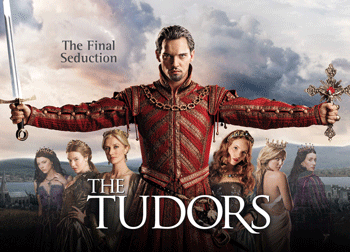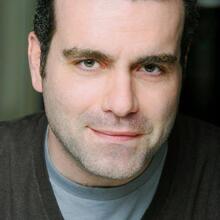The lion is in winter. Anne Boleyn is a distant memory, the male heir is in place and the Church of England has been established. In other words: every last ounce of scandal has been wrung from the popular consciousness of the story of King Henry VIII. There’s scarcely a juicy historical morsel left to savor for the folks at “The Tudors,” which is beginning its fourth and final season on Showtime. And while an account of the latter days of a once robust now impotent sovereign would hardly seem an enviable task for writers and viewers alike, it has had a liberating effect on a show that has spent the majority of its run mired in an identity crisis brought about by the enormous popular appeal and historical specter of its own subject.
From its inception in 2007, “The Tudors” has tried to have it both ways, desiring the prestige and acclaim of its artistic ancestor—the acclaimed 1997 film “Elizabeth” was written by the “Tudor” creator Michael Hirst—while at the same time trying to appeal to the substantial bodice-ripper crowd, whose concerns lie more in the area of affairs of the heart than in affairs of state. The result has proven to be less than satisfactory for all interested parties.
Part stilted historical drama, part soft-core pornography, “The Tudors” lacks what made Hirst’s “Elizabeth” such a striking piece of work: the study of the personal and spiritual evolution of one of history’s greatest leaders. As “The Tudors” draws to its conclusion, Hirst finally seems to be allowing for Henry as Henry to come forward unobstructed. Behold, the man.
The show has never suffered for want of talented actors: Sam Neill, Colm Wilkinson and Jeremy Northam have always been more than up for the task, putting together subtly textured portrayals, occasionally interspersed with some much- needed over-the-top bravura. Unfortunately, the writing has never matched the quality of the performances. It is a testament to the actors that they were able to essay such multi-dimensional characters from the thin membrane of text passing itself off as a script.
More often than not, episodes of “The Tudors” jumped from plot point to plot point with all the subtlety of crashing cymbals. Dialogue was a fusion of a ninth-grade history textbook and a discarded script from an episode of “Dynasty.” It’s an old writing tenet that one should show and not tell the audience about characters, that is, demonstrate through their behavior who they are, as opposed to stating it outright in the piece. The writing on “The Tudors” has missed the mark in this area; for instance, one doubts that Sir Thomas More continually and explicitly labeled himself a humanist in big bold letters in everyday conversation.
However, if the first episode of the fourth season is any indication, “The Tudors” just might have found its way. Freed from the bondage of having to regurgitate the most significant facts of Henry’s reign, the writing seems less cumbersome; the characters now seem to be uttering phrases that actual people might say as opposed to reciting historical exposition.
The fourth season of the series opens in 1540 with Henry struggling to keep up with his child bride Catherine Howard (Tamzin Merchant) while moving into the final years of his historic reign. Intrigue still abounds, but perhaps with the slowing down of the sovereign, Hirst feels less pressure to smash as much information (and gratuitous sex) as possible into one episode. As such, the frantic energy that seemed fundamental to the show in its first three seasons is less evident.
Aristotle maintained that poetry is more philosophical than historical and when “The Tudors” gestures toward that belief it is at its finest. One benefit of performing in a historical piece over a significant period of time is the opportunity it affords an actor to develop a character in a more organic fashion than when dealing with the temporal constraints of a feature film or a play. It is to Jonathan Rhys Meyers’ credit that he has seized this opportunity and put forward a remarkable character study.
Unlike in previous seasons, where he could rely on the strong performances of Neil and Northam, the show is now entirely in Meyers’ hands. Merchant’s portrayal of Howard is particularly jarring, though it’s not entirely her fault (the director’s referencing Mena Suvari’s nymphet cheerleader in “American Beauty” does not help matters). The character is one-note, and too much time is spent establishing her youth; the show could do with several less giggle sessions and bizarre striptease numbers.
In the early days of the series Meyers’ Henry was akin to a rambunctious puppy, all big paws and excess energy. His aging of Henry has been a nuanced progression. Now as Henry moves a bit more languidly than before, his voice coarser, his movements more deliberate, what Meyers has maintained is the spiritual wanderlust that makes the great king so fascinating. His Henry is a man with an interior void so large and transparent, that at times it can be painful to watch.
One can’t help but wonder what the show could have been if it focused on the King as a man, instead of the King as cartoon, from the beginning.









Now we await the series on King Henry IX, as Jacobites called him. He was the son of Bonnie Prince Charlie. This Henry was made a cardinal in his early twenties, and lived to a ripe old age in a palace near Rome surrounded by catamites. In the eighteenth century and early nineteenth century this did not bother the popes and the rest of the hierarchy. though an English woman Mre Piozzi, formerly Mrs Thrale, was flabbergasted. Should such a series be made I anticipate that Conservative Catholics will blame his behaviour on the 2nd Vatican Council.
CORRECTION Henry IX was the son of James III (the Old Pretender) and brother of Bonnie Prince Charlie. He could claim kingship when his brother died.